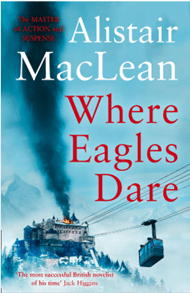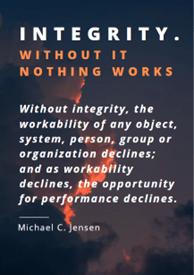As a young person, I had a few authors that I really enjoyed in the fictional space. Authors included Zane Grey (100+ cowboy stories), CS Lewis (Chronicles of Narnia) and Alistair MacLean, whose books were often set in the timeframe of WWII and the Cold War. Some of MacLean’s books were made into movies, including The Guns of Navarone, Ice Station Zebra and Where Eagles Dare.
First published in mid-1967, Where Eagles Dare is a great read (and movie). A Goodreads review infers that this book and then the movie “set the pace for modern action thriller.” In other words, it was an innovative, “leading edge” model that many have followed.
With that in mind, I have been thinking about another book, Dare to Lead, by Brene Brown. There are so many ways to find applications to our current golf industry and our careers as PGA professionals. One quote stands out to me right now and it is, “Own the fear, find the cave and write a new ending for yourself, for the people you’re meant to serve and support…choose courage over comfort. Choose whole hearts over armor…choose the great adventure of being brave and afraid. At the exact same time.”
Let’s consider a few “Daring to Lead” examples that apply for each of us in the golf industry:
- The manner in which we “represent” (I call this “AUTHENTICALLY FAKING IT”)
- Ourselves: I love my nickname, The Mayor. Mainly because I could do a lot worse than that. I’m not really that outgoing, in fact, I am more a melancholy (according to one personality test) than a sanguine (e.g. extrovert.) Yet, somehow I got the nickname and then I “owned it.” It started primarily because one day in my late-20s, I made a conscious choice to “be an authentic fake” when I was in public, and basically separate “Monte: The Person” from “Monte: The Golf Professional.” In this way, if someone said something negative about me as the head professional, or the facility, etc. it wasn’t an attack on me personally or my character. That helped me a lot. It also freed me up to be “on the edge” of my comfort zone. I could be funnier, more of an entertainer. I could be more direct when needed by my role, more of authority for the same reason.
- Our family: By distinguishing between my “professional life” and my “personal life” I was able to find some real balance (not always), but sometimes. I did learn that a worthy goal of keeping the difference between “who I am in public” and “who I really am in private” as small as possible was a good one. A mentor shared that “the closer they are, the less stress you’ll have” and it really stuck with me. I am carrying my family name everywhere I go, just like my facility/employer’s brand/name, so I’ve got to carry it well and hopefully leave it better than I found it.
- Our facility and our PGA Association/Section/Chapter: As mentioned I made a conscious choice to “represent” my facility well…at all times, whether I’m at the grocery store, at a restaurant or playing in a pro-am. Someone is always watching, so I’m always interviewing and either building up my brand, my credibility or tearing it down. The same applies to how my actions, words and similar are my “interview” on behalf of my employer and/or my association.
- The manner in which we “take responsibility” for Our Word (INTEGRITY) In this view, I’ve been taught that “integrity” is not about morality (like being trustworthy, being ethical). Instead, “integrity” (or perhaps “our professionalism”) is based on how we “honor our word” and ensure it is “whole and complete”.
In a 2009 interview, Michael Jensen stated that an individual’s word is whole and complete when they honor it. This can be achieved by either keeping their word on time or informing all parties as soon as they realize they cannot keep their word and cleaning up any resulting mess. To maintain integrity, one must carefully consider before giving their word and never give their word to two or more things that are mutually inconsistent.
“If you’re up to anything important in life, you will not always be able to keep your word, and that’s alright, but if you are a person of integrity, you will always honor your word.”
Follow Up Question: Why does integrity matter to us if we are “Daring to Lead?” According to Jensen, “Integrity is important to individuals, groups, organizations and society because it creates workability. Without integrity, the workability of any object, system, person, group or organization declines; and as workability declines, the opportunity for performance declines. Therefore, integrity is a necessary condition for maximum performance. As an added benefit, honoring one’s word is also an actionable pathway to being trusted by others.”
Digging deeper into Integrity: Without it Nothing Works, we can find more on this concept of “workability” as the reason for having integrity. Notable distinctions include:
- “The personal and organizational benefits of honoring one’s word are huge—both for individuals and for organizations—and generally unappreciated.” | Those who conduct a quick cost/benefit analysis on whether or not it’s worth honoring their word to someone or not will eventually pay a much higher price than they think. And not only them, their brand, their facility, employer and community will suffer for it.
- “We can honor our word in one of two ways: by keeping it on time and as promised, or if that becomes impossible, by owning up to the parties counting on us to keep our word in advance and cleaning up the mess our failure to keep our word creates in their lives.” | Re-read that quote and you’ll likely see it is the foundation of the PGA word we all tend to use called “professionalism.” Having integrity, honoring our word and similar helps others (especially those we lead and influence) have a high level of respect for us and often find themselves enjoying being around us.
- “By failing to honor our word to ourselves, we undermine ourselves as persons of integrity, and create “unworkability” in our lives.” | Being out-of-integrity with friends and family, with my coworkers, employer and/or customers/members is more costly than we tend to think. Unworkability is where stress, anxiety, worry, fear and similar abide.
- “There are unrecognized but significant costs to associating with people and organizations that lack integrity.” |If you find yourself being “fired” by friends (and possibly family), that may be a strong sign that the costs are too high for them. Conversely, if you are finding the costs of being a friend to someone who lacks true integrity (and regularly fails to honor their word), that may be the sign to “separate yourself” from them.
Follow Up Conclusion: So if I can become better, (more complete, more whole) at honoring my word (and having integrity), the people, facility and organization I’m a part of have a better chance at performing well? The simple answer is, yes…not simple to do, but simply yes. And, the impact-making differences from this are worth the effort (right?)
As a follow up to this article, we’ll plan to write more on Where Eagles Dare (to Lead) Part 2. Topics that are likely to come up include: Delegating, Reporting, Proving our Value, Recruiting and possibly more.
If you found any of this article helpful or thought provoking, I would love to hear from you and engage with you about it. Further, I would love to engage with you about your “one and only career” if you’ll permit me to. (And now, let’s enjoy the sun and incredible weather we’re blessed with here in the PNW!)
Monte Koch, PGA Certified Professional, CEIP
PGA of America | Career Coach & Consultant/Certified Interview Coach
Certified Predictive Index Practitioner
mkoch@pgahq.com
206.335.5260
Based in South King County, WA

